Current News
/ArcaMax
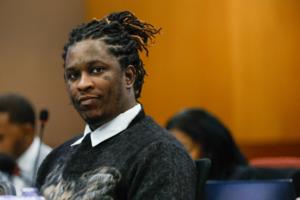
Young Thug reposted a witness's photo. It could land him in prison
ATLANTA — Five months after Atlanta rapper Young Thug pleaded guilty in a lengthy gang trial, Fulton County’s district attorney is asking a judge to revoke the superstar’s probation.
In a motion filed Wednesday night, District Attorney Fani Willis said the musician, whose real name is Jeffery Williams, “engaged in conduct that directly ...Read more

Venezuelan migrant from Colorado is among deportees taken to prison in El Salvador
DENVER — At least one detainee from the immigration detention facility in Aurora has been sent to an El Salvadoran prison, an immigrant assistance group confirmed Thursday.
Nixon Azuaje Perez, 19, is a Venezuelan migrant who was held at the local U.S. Immigration and Customs Enforcement detention center before being transported to Texas, then...Read more

The Trump administration is giving schools 10 days to certify they have no 'illegal DEI practices'
The U.S. Department of Education on Thursday instructed that if state education agencies wish to continue receiving federal funding, they have 10 days to certify that schools are complying with anti-discrimination laws and have no “illegal DEI practices.”
A letter released by the federal education department cites the U.S. Supreme Court’...Read more
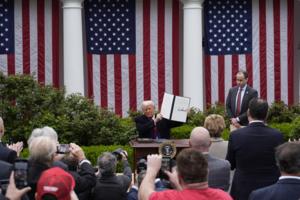
What do Americans think of Trump 'Liberation Day' tariffs? What a new poll found
On Wednesday, President Donald Trump unveiled sweeping tariffs on dozens of countries that run trade surpluses with the United States, including major trading partners such as the European Union, China and Japan. He also imposed a minimum 10% tariff on all imports.
“This is one of the most important days, in my opinion, in American history,�...Read more

Beshear sues over 'latest power grab' law that would restricting Kentucky governor's regulatory power
LEXINGTON, Ky. — Kentucky Gov. Andy Beshear is suing to block a law that he claims infringes on his executive power to issue regulations.
The suit, filed late last week, calls House Bill 6 the latest of several efforts by the Republican-led Legislature to “usurp the Governor’s supreme executive authority,” the Democratic governor wrote....Read more
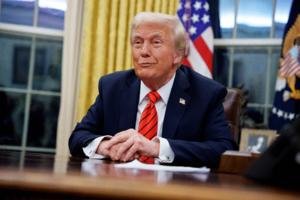
Trump fires national security aides after right-wing activist Laura Loomer deems them disloyal
President Donald Trump reportedly fired several White House national security aides Thursday after right-wing provocateur Laura Loomer dished dirt on their supposed “disloyalty” — despite no apparent disciplinary action for the leaked Signal group chat scandal.
At least six and as many as 10 members of the National Security Council got ...Read more
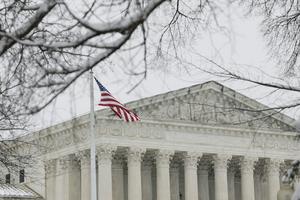
How a lone judge can block a Trump order nationwide – and why, from DACA to DOGE, this judicial check on presidents’ power is shaping how the government works
When presidents try to make big changes through executive orders, they often hit a roadblock: A single federal judge, whether located in Seattle or Miami or anywhere in between, can stop these policies across the entire country.
These court orders have increasingly become a political battleground, increasingly sought by both ...Read more

Above-average hurricane season, US landfall chances in CSU forecast
The first hurricane forecast of the year from the experts at Colorado State University released Thursday calls for an above-average season with nine hurricanes and a better than 50% chance a major hurricane will strike the U.S.
The CSU seasonal forecasts were originated by the late William Gray in 1984, but continue out of the school’s ...Read more
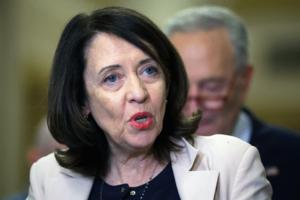
Washington Sen. Maria Cantwell leads bipartisan push to give Congress control over tariffs
Amid a widening trade war launched by President Donald Trump, Washington Sen. Maria Cantwell is leading a bipartisan push to give Congress more authority in setting tariffs.
Cantwell on Thursday introduced legislation that would limit the ability of the president to impose tariffs unilaterally. Cantwell, a Democrat, co-sponsored the bill with ...Read more

Nearly 3 months after LA fires, 30th victim discovered in Altadena ruins
LOS ANGELES — Nearly three months after flames engulfed Altadena, the death toll from the Eaton fire climbed to 18 on Wednesday after investigators with the L.A. County Medical Examiner's Office discovered human remains.
A six-person special operations response team responded Wednesday to the 900 block of Boston Street to investigate ...Read more

Proposed bill would let Nevada students choose which school they attend
LAS VEGAS — A proposed bill would allow students in Nevada to choose which school they attend, regardless of their ZIP code.
Assembly Bill 533, sponsored by Education Committee Chair Selena Torres-Fossett, D-Las Vegas, would allow students to apply for schools outside of their attendance zones. It gives priority to students in the zone and ...Read more

Rachel Morin case: Experts discuss what goes into choosing jurors for a high-profile murder trial
BALTIMORE — It took just two days to seat a jury in the trial of the man accused in the 2023 killing of Rachel Morin, despite concerns from lawyers on both sides about pre-trial publicity and potential juror bias. The case became a political talking point in the immigration debate during the 2024 presidential race.
Victor Antonio Hernandez-...Read more

NYPD cops suspended for fleeing fiery fatal Manhattan crash after chasing driver, sources say
NEW YORK — Two NYPD officers fled the scene when the driver of a stolen SUV they were pursuing died in a fiery Manhattan crash, returning to their Bronx precinct without reporting what happened, police sources said Thursday.
Both officers have been suspended as the NYPD’s Force Investigation Division investigates their actions, a police ...Read more

VW and Mercedes answer Trump with price hikes, output shifts
Europe’s automakers are raising prices and preparing to shift car production to the U.S. to try to protect themselves from President Donald Trump’s tariffs.
Volkswagen AG plans to add import fees to the sticker prices of its vehicles shipped into the U.S., indicating Trump’s 25% auto duties will have an immediate effect on Europe’s ...Read more
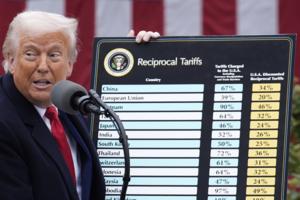
Preparing tariff retaliation, US allies say Trump will 'buckle under pressure'
WASHINGTON — The Trump administration is facing global blowback after announcing a dramatic series of tariffs on countries around the world, with U.S. adversaries and allies alike promising crushing responses that could devastate the American economy.
Stock markets in the United States, Europe and Asia plunged in the aftermath of President ...Read more

Ex-Georgia Sen. David Perdue, Trump's pick as ambassador to China, faces Senate hearing
WASHINGTON — Former U.S. Sen. David Perdue, who has been tapped by President Donald Trump to serve as ambassador to China, will have a nomination hearing Thursday morning with the Senate Foreign Relations Committee.
The hearing will allow Perdue, who led companies like Dollar General and Reebok before entering politics, to share how he plans ...Read more

On water recycling, Nevada is leagues ahead of other states, study shows
LAS VEGAS — When it comes to recycling the most precious resource in the Colorado River Basin, Nevada blows the other six states out of the water, a new report has confirmed.
Researchers from the University of California, Los Angeles, combed through often-inaccessible wastewater data to show that Nevada leads the seven states with a rate of ...Read more

Kansas vaccine law could be struck down
What attracted Katlin Keeran to occupational therapy for older adults was the chance to help provide them with dignity. Having enough mobility to get out of bed or use the bathroom yourself – those are the kinds of things that help maintain an individual’s independence.
So when Powerback Rehabilitation, which provides services at Town ...Read more
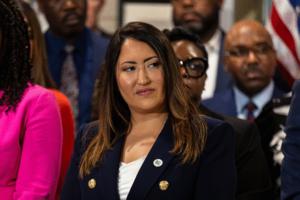
NYC chancellor takes aim at social challenges keeping kids out of school
NEW YORK — Teens are struggling with their mental health. Families are concerned about bullying, vaping and drug use. Students do not always feel safe commuting to school.
Over two months late last year, the newly minted leader of New York City’s public schools, Chancellor Melissa Aviles-Ramos, held feedback sessions in each of the five ...Read more
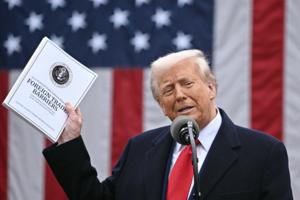
Trump defends tariffs, claiming 'the patient lived' amid markets meltdown
President Donald Trump Thursday defended his shocking plan for massive tariffs by claiming “the patient lived,” a less-than-reassuring message about the American economy as global markets melted down in a stunning sell off.
“The operation is over. The patient lived, and is healing,” Trump wrote on his social media site. “The prognosis...Read more
Popular Stories
- Russian punk band Pussy Riot warns America to 'wake up!' at Washington Square Park protest in NYC
- Northern Michigan remains at standstill as Trump's help sought
- Analysis: Triumphant Trump rolls dice on tariffs despite warnings, risks
- Trump says he'll stop health care fraudsters. Last time, he let them walk
- From business exports to veteran care − here’s what some of the 35,000 federal workers in the Philadelphia region do





